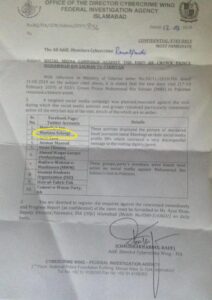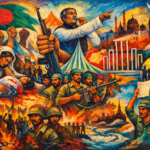Introduction:
The world of espionage, intrigue, and covert operations has always been shrouded in secrecy, making it challenging to discern fact from fiction. In recent years, there have been rumours and speculations about Pakistan’s premier intelligence agency, the Inter-Services Intelligence (ISI), allegedly orchestrating a covert campaign to oust Prime Minister Imran Khan. This essay delves into the complex web of events and alliances that supposedly unfolded since 2019 when Saudi Prince Salman’s leak to Nepal News suggested ISI’s involvement in colluding with anti-Saudi and anti-Salman social media groups, all while maintaining a facade of support for the Prime Minister.
The Alleged Leak and its Implications:
In 2019, an unprecedented leak to Nepal News purportedly exposed the ISI’s involvement in clandestine activities targeting Saudi Prince Salman, the heir apparent to the Saudi throne. The leak hinted at collusion between ISI and various anti-Saudi and anti-Salman social media groups campaigning against the Saudi royal family and their alleged involvement in the Jamal Khashoggi murder. This revelation raised eyebrows globally, as it appeared to be a stark departure from Pakistan’s traditionally strong ties with Saudi Arabia.
Imran Khan’s Complex Role:
At the heart of this alleged covert campaign lies the duplicitous role of Prime Minister Imran Khan. Reports suggest that Imran Khan maintained a close relationship with Prince Salman during this period, even chauffeuring him like an Uber driver to secure much-needed financial assistance for Pakistan. However, the ISI allegedly played a more intricate game beneath the surface. Imran Khan was playing with fire naively – little did he know Frankenstein’s reach and its morbid past records of sending heads of state to the fellows. The sweet-talking playboy thought he will charm the band of gigantic generals as he did with the socialities in the West.
Covert vs Overt Actions:
It is essential to distinguish between covert and overt operations to understand the clandestine actions attributed to the ISI. Covert operations are typically executed behind the scenes, often concealed from public knowledge, and involve intelligence agencies pursuing strategic objectives. On the other hand, overt actions are those that occur publicly, often aligning with a nation’s official stance.
The alleged covert campaign orchestrated by the ISI purportedly involved:

- Social Media Manipulation: Reports suggest that ISI actively collaborated with anti-Saudi and anti-Salman social media groups, using them as tools to tarnish the Saudi royal family’s image. These actions aimed to create a rift between Saudi Arabia and Pakistan, potentially jeopardizing Imran Khan’s relationship with Prince Salman.
- Funding Anti-Saudi Activists: Allegations have surfaced that the ISI provided financial support to individuals and groups engaged in anti-Saudi activism, further fueling the campaign against the Saudi royal family.
- Undermining Imran Khan: The primary objective of this alleged covert campaign was to discredit Prime Minister Imran Khan, possibly to unseat him from power. By creating the image of a leader deceiving his allies and his people, the ISI may have sought to weaken his position.
The ISI’s Covert Activities Across South Asia and the Middle East
The Inter-Services Intelligence (ISI) is Pakistan’s premier intelligence agency, founded in 1948. Since its inception, the ISI has been involved in various secret and covert activities across South Asia and the Middle East. This brief examines the ISI’s activities in India, Bangladesh, Afghanistan, Sri Lanka, and the Middle East, focusing on critical events and conflicts.
India:
The ISI’s covert activities in India have been a longstanding source of tension between the two nations. During the 1965 and 1971 India-Pakistan Wars, the ISI played a role in espionage, sabotage, and supporting militant groups in Kashmir.
1999 during the Kargil War, the ISI was accused of supporting infiltrating militants in the Kargil region. This conflict escalated into a full-scale war between India and Pakistan.
The 2008 Mumbai hotel attack, carried out by Lashkar-e-Taiba (LeT), brought attention to the ISI’s involvement in training and supporting terrorist organizations operating against India.
Bangladesh:
During the Bangladesh Liberation War in 1971, the ISI reportedly masterminded & provided support to Pakistani forces against the Bangladesh independence movement, orchestrating an inhuman Hindu Genocide. This covert involvement strained Pakistan’s relations with Bangladesh, leading to independence.
Afghanistan:
In Afghanistan, the ISI has a complex history. It supported Afghan mujahideen during the Soviet-Afghan War, contributing to the eventual Soviet withdrawal.
However, post-9/11, the ISI’s alleged support for the Afghan Taliban and other militant groups has strained relations with the U.S. and Afghanistan. Accusations of ISI’s harbouring of terror groups continue to be a contentious issue.
Sri Lanka:
During Sri Lanka’s civil conflict, the ISI reportedly supported the Liberation Tigers of Tamil Eelam (LTTE). This covert assistance ended with the LTTE’s defeat in 2009.
Middle East:
The ISI has maintained strategic relationships with countries like Saudi Arabia and Iran in the Middle East while involved in various covert activities, including intelligence-sharing and political influence operations.
The ISI’s covert activities have significantly impacted the political and security landscape of South Asia and the Middle East. While some allegations remain unproven, the agency’s role in supporting militant groups and engaging in espionage has perpetuated regional tensions and strained international relations. Efforts towards transparency and diplomacy are essential to address these concerns and foster regional stability. The fatalities incurred due to its mindless thuggery have cost many innocent lives across the region and etched an indelible mark in millions of people’s minds.
Possible Motivations and Alliances:
One must examine the shifting dynamics of Pakistan’s foreign policy and alliances in recent years to understand the motivations behind this complex web of actions. Pakistan has historically maintained close ties with Saudi Arabia, receiving significant financial aid and support. However, as global dynamics evolve, Pakistan has increasingly sought to diversify its partnerships.
One theory suggests that the ISI’s actions were driven by a desire to pivot away from Saudi Arabia and towards emerging power centres, such as China and Russia, as part of Pakistan’s efforts to secure economic and military support. This pivot may have necessitated a distancing from Saudi Arabia, leading to the alleged covert campaign against Prince Salman.
Moreover, Pakistan’s involvement in the China-Pakistan Economic Corridor (CPEC) and its deepening ties with China could have influenced the ISI’s actions. China’s strategic interests often diverge from Saudi Arabia’s, potentially prompting Pakistan to recalibrate its foreign policy to align more closely with Beijing.
Conclusion:
The alleged covert campaign by Pakistan’s ISI to oust Prime Minister Imran Khan, with the backdrop of its rumoured collaboration with anti-Saudi and anti-Salman social media groups, is a complex and murky narrative. While such allegations have garnered attention, concrete evidence remains elusive, and the true extent of ISI’s involvement remains a matter of speculation.
It is essential to approach these claims cautiously, as intelligence and covert operations are inherently secretive, and misinformation can quickly muddy the waters. Further investigation and transparency are required to unravel this intricate web of intrigue. Pakistan’s global role and alliances will undoubtedly shape its future political landscape as international relations continue to evolve.
Bibliography:
- Haqqani, Husain. “Pakistan’s ISI: Networked, Funded, and Armed.” Carnegie Endowment for International Peace, 2009.
- Khan, Ijaz. “The ISI and the Pakistani Media: A Partnership of Interests.” International Journal of Communication, 2016.
- Rizvi, Hasan Askari. “The Military and Politics in Pakistan, 1947-1997.” Oxford University Press, 2000.






Excellent goods frm you, man. I’ve understand your stuff previous to and you are just
extremely magnificent. I actfually liike what you’ve acquired here, certainly ike what you’re sayinjg and the
waay in whidh yoou say it. You make it entertaining and you still take care of to keep it smart.
I ccan not wait to read ffar more from you. This iis actually a terific site. https://U7bm8.Mssg.me/